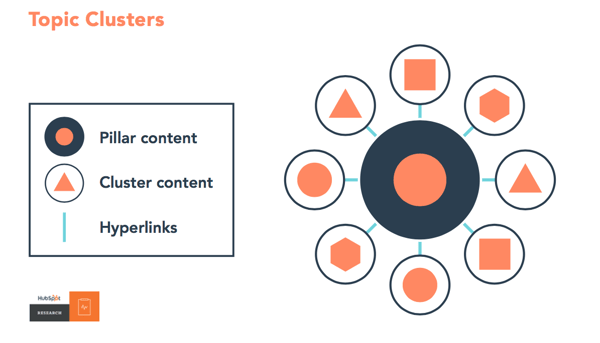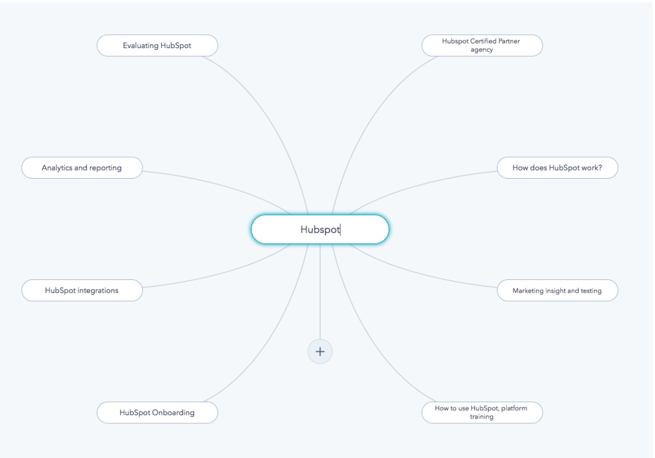In today's digital world, topic clusters and content marketing go hand in hand. Learn about the relationship between these two things and why informative hubs of related content is the only way to go.
When it comes to your content marketing, your team is probably spending a lot of time creating, distributing and promoting their content to your audiences.
But if you want to grow sustainable traffic that fuels your marketing goals, you can’t just be producing content ad-hoc, hoping that:
1. people will find you
2. they’ll like what you’ve written and...
3. everything will go swimmingly and you’ll have more leads in your CRM than your sales team can shake a stick at
You need a clear strategy to make sure you don’t start creating articles that are never going to appear in people's search results.
Topic clusters are key to this. But what are they and how can you create topic clusters that help your marketing to achieve its goals?
Don't miss this topic clusters video from HubSpot:
What are topic clusters?
It's likely that you have been battling with your competition, optimising your web pages, articles and landing pages to master search trends and rank higher in Google.
Google's latest shift in their algorithms is towards favouring topic-based content. This favours websites that are content-focused. Google is no longer looking at exact keywords but topic clusters.
In HubSpot's words, 'a topic cluster model, focuses around a 'pillar' page which acts as a hub of content around a topic and multiple content pages that are related to the same topic link back to the pillar page and to each other'.
Linking the content together shows the search engine you have authority on a topic. Over time, you should rank higher and higher for the topic it covers. It effectively weaves your content together and creates a site architecture that is easy to crawl.
So, how should we be looking to produce content now?
Topic clusters and content marketing explained
An effective content strategy therefore means ranking for an entire topic, rather than a few specific keywords. These topics are formed of pillar pages and content clusters (or sub-topics, as we like to call them), which are long-tail keywords directly relating to the main topic.

Image source: HubSpot
Pillar pages are long-form web pages designed to give the reader a comprehensive overview of each of the sub-topics that surround your main topic. They should have a clear conversion point, guiding visitors in the right direction towards becoming a lead
The sub-topics are also articles, but they go into much greater depth and specifically look at one element of the main topic. For example, if our pillar page was about inbound marketing, one of our sub-topics might be marketing automation.
By linking up all your relevant content, (articles, web pages, landing pages etc) you are showing Google that you know what you’re talking about, and that you do this better than anyone else. Google will reward you with overall authority of that topic, and by having a well connected website, it will make it much easier for the search engine to crawl, which will also help to boost your search rankings.
Pretty cool, huh?
Join two of our consultants on a content strategy webinar, where they'll talk you through the process of setting up topic clusters and give you insight into some of the tips and tricks they've picked up whilst doing this for our clients.
How topic clusters help people, too
Of course, we’re not just writing content for search engines. We’re creating content that will help to educate our audiences and help prospective customers find us.
When we’re looking to make a purchase, and we spend time doing research online, we want to find things easily, and we want to find them fast. Imagine how great it would be if we stumbled across a piece of content that answered our original question. Most good articles will do this, but they often throw up more questions that you’ll want answering, and you’ll have to go back to Google to find the answers.
What if our original article not only gave us the other questions we should be thinking about but might not have considered, but also gave us a quick and easy route to find those answers without having to go back to our Google search results?
That’s exactly what topic clusters do.
New to inbound? Learn about the inbound marketing methodology and how to get started.
Here’s a topic cluster example:

Here you can see that this cluster is focused around HubSpot. We’ve added eight sub-topics that we want to create content around to grow our authority in this area.
As an Elite HubSpot solutions partner, this is incredibly important for showing our prospective customers that we're experts in all aspects of the HubSpot platform, from evaluating the right solution for you right through to HubSpot onboarding and and making sure you’re unlocking the full value of the HubSpot platform through further training and reporting.
But we’ve actually gone one step further
Under each of those sub-topics we’ve listed out nine articles that we want to create, and once all of these are created, each sub-topic will eventually become a pillar page in its own right.
We won’t share our secrets right now, but if you’d like to learn more, why not watch our content strategy webinar, where we delve into this in more detail.
HubSpot’s content strategy tool is still currently in beta, and not everyone will have access, but if this is something you’d be interested in, please get in touch. You’ll be able to find out if you have access to the tool by clicking the content drop down.

How to create topic clusters that boost your organic ranking
By now you might be wondering how you can get started with building out topic clusters for your business. Don’t worry, we’ve got you covered:
1. Identify your main topics
Naturally these should align with what you do or what you sell. For example, ours are:
2. Think about all the different areas that come under these pillar topics
There is likely to be some overlap between topics, and that’s fine, it will actually help to boost your rankings in search engines over time.
3. Do your keyword research
This is important. Make sure that you’ve spent time finding out what your prospective customers are actually searching for. This will also help you to uncover additional content ideas that you can add into your topic clusters.
Discover more about how to master search trends and rank higher
4. Create your 3-6 month content plan
Start by writing all of your pillar pages first, then make a start on each of your sub-topic articles. Starting with your pillar page will help you to link everything together in a logical order.
5. Review, measure and iterate
Make sure that you are regularly checking your articles for relevance and making changes to them so that they stay up to date. Constant iterations to content also help to ensure that search engines take notice.
How to create topic clusters that actually boost your organic ranking
As more and more content is produced, the relationship between topic clusters and content marketing will only get stronger, helping Google and other search engines to find and rank truly standout content.
Changing your strategy focus from keywords to topic areas to get on board with this trend will really help your marketing to perform. Not only will you make it easier for people to find you, but you’ll also be able to give them more reason to stay instead of heading back to Google to find more answers.
Having a good content strategy is crucial for getting to that lucrative first position in search engine results pages and ultimately for growing your business, but we appreciate that it can be a daunting task to put together a plan for the next six to twelve months, and stick to it!
Learn more about content marketing, the fundamentals, and how to approach your next strategy in our dedicated ebook, 'Content Marketing for Beginners' — click the image below to download your copy now.
Heading
Separated they live in Bookmarksgrove right at the coast of the famous Semantics, large language ocean and many more stuff and more more more


Tom is BabelQuest's Principal Copywriter. He has a PhD in Creative Writing from the University of Southampton and is a novelist with Sparkling Books.





.png?width=50)

.png?width=50)
.png?width=50)


































